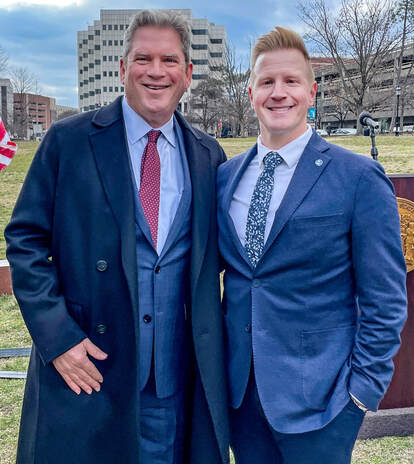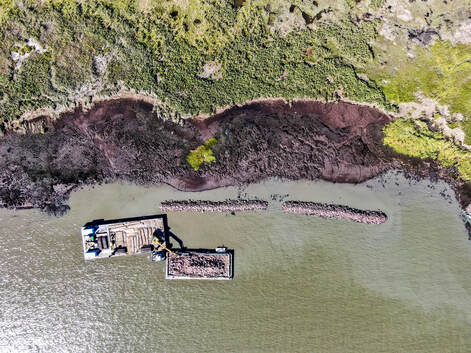 NJ Department of Environmental Protection Commissioner Shawn M. LaTourette (R), with Tim Dillingham, Executive Director of the American Littoral Society. NJ Department of Environmental Protection Commissioner Shawn M. LaTourette (R), with Tim Dillingham, Executive Director of the American Littoral Society. The American Littoral Society has been named one of the initial recipients of a New Jersey grant program designed to fund projects that use nature-based techniques to combat the effects of climate change. As part of this program, the Littoral Society's project for restoring marshlands at the mouth of the Maurice River will receive funding through the new Natural Climate Solutions Grant Program. This innovative program, one of the first of its kind in the nation, is funding $24.3 million in projects to mitigate climate change by creating, restoring, and enhancing New Jersey’s green spaces and tree canopies in urban areas, as well as natural carbon sinks, such as salt marshes, seagrass beds, forests, and parks. Grant recipients were congratulated by NJ Department of Environmental Protection Commissioner Shawn M. LaTourette during an event in Trenton on Wednesday, Jan. 18. “We appreciate the confidence of the Commissioner and the Department in awarding us this grant to undertake this necessary work," said Tim Dillingham, Executive Director of the American Littoral Society. "New Jersey is Ground Zero for the impacts of climate change and harnessing the power of nature is the most effective response available to us. Our project takes place in one of the most vulnerable communities along the Delaware Bayshore and we thank the Murphy Administration for bringing attention and resources to partner with this community as it faces the impact of climate change."  A critically eroded section of Basket Flats. A critically eroded section of Basket Flats. The funding comes through New Jersey’s participation in the Regional Greenhouse Gas Initiative (RGGI), a multi-state, market-based program that establishes a regional cap on carbon dioxide emissions from fossil fuel power plants. The RGGI provides New Jersey with auction proceeds to invest in programs and projects designed to help meet its climate, clean energy, and equity goals. Natural resources that sequester carbon play a critical role in meeting the State’s 2050 goal of an 80% reduction in greenhouse gases below 2006 levels. The Littoral Society has been a leader in developing nature-based approaches to responding to climate change along our coast. The Society's work integrates ecological restoration with enhanced resiliency for seaside communities. The Delaware Bay is one of the most important coastal environments in the mid-Atlantic region and is the home to bay-related economies built around oysters, fishing, birdwatching, and ecotourism. Both its natural resources and its communities are becoming increasingly vulnerable to climate change and storms. The towns, oyster fleet docks, and marshes surrounding the Maurice River are among the most vulnerable areas within the bay, largely due to the disappearance of wetlands at the estuary's mouth. Since 1985, the marshlands of Basket Flats - a peninsula of salt marsh that extends from the river mouth’s western shore - have lost over a quarter mile, exposing upstream areas - including the towns of Shellpile and Port Norris - to increased threats from storms and tides. The first priority is the critically eroded Basket Flats, a peninsula of salt marsh that extends from the mouth’s western shore and protects the oyster docks at Bivalve and Matts Landing from the waves and currents of the open bay. Since 1985, Basket Flats has been winnowed by over a quarter mile, virtually eliminating an entire reach — or bend — in the river. The erasure of Basket Flats has also caused an increase in the amount and frequency of wave energy hitting Northwest Reach, on the opposite shore, resulting in a half-mile-wide swath of shallow, open water where there were once healthy tidal wetlands. "Tidal marshes are masters at taking carbon out of the atmosphere and storing it safely away in the ground," Dillingham said. "They also provide critical habitat and provide protection against extreme wave action and flooding, enhancing the resiliency of our coastal communities." At the grant announcement event, which was held from 2 to 3 p.m. on Wednesday, Jan. 18 at Mill Hill Park in Trenton, Commissioner LaTourette was joined by Trenton Mayor Reed Gusciora, the NJ Department of Environmental Protection’s Office of Environmental Justice Director Kandyce Perry, New Jersey Conservation Foundation Co-Executive Director Jay Watson, and American Littoral Society Executive Director Tim Dillingham. Comments are closed.
|
Archives
July 2024
Categories
All
|

